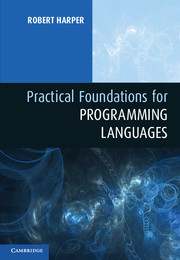Book contents
- Frontmatter
- Contents
- Preface
- Part I Judgments and Rules
- Part II Statics and Dynamics
- Part III Function Types
- Part IV Finite Data Types
- Part V Infinite Data Types
- Part VI Dynamic Types
- Part VII Variable Types
- Part VIII Subtyping
- 23 Subtyping
- 24 Singleton Kinds
- Part IX Classes and Methods
- Part X Exceptions and Continuations
- Part XI Types and Propositions
- Part XII Symbols
- Part XIII State
- Part XIV Laziness
- Part XV Parallelism
- Part XVI Concurrency
- Part XVII Modularity
- Part XVIII Equational Reasoning
- Part XIX Appendix
- Bibliography
- Index
23 - Subtyping
from Part VIII - Subtyping
Published online by Cambridge University Press: 05 February 2013
- Frontmatter
- Contents
- Preface
- Part I Judgments and Rules
- Part II Statics and Dynamics
- Part III Function Types
- Part IV Finite Data Types
- Part V Infinite Data Types
- Part VI Dynamic Types
- Part VII Variable Types
- Part VIII Subtyping
- 23 Subtyping
- 24 Singleton Kinds
- Part IX Classes and Methods
- Part X Exceptions and Continuations
- Part XI Types and Propositions
- Part XII Symbols
- Part XIII State
- Part XIV Laziness
- Part XV Parallelism
- Part XVI Concurrency
- Part XVII Modularity
- Part XVIII Equational Reasoning
- Part XIX Appendix
- Bibliography
- Index
Summary
A subtype relation is a preorder (reflexive and transitive relation) on types that validates the subsumption principle:
If τ′ is a subtype of τ, then a value of type τ′ may be provided whenever a value of type τ is required.
The subsumption principle relaxes the strictures of a type system to permit values of one type to be treated as values of another.
Experience shows that the subsumption principle, although useful as a general guide, can be tricky to apply correctly in practice. The key to getting it right is the principle of introduction and elimination. To determine whether a candidate subtyping relationship is sensible, it suffices to consider whether every introductory form of the subtype can be safely manipulated by every eliminatory form of the supertype. A subtyping principlemakes sense only if it passes this test; the proof of the type safety theorem for a given subtyping relation ensures that this is the case.
A good way to get a subtyping principle wrong is to think of a type merely as a set of values (generated by introductory forms) and to consider whether every value of the subtype can also be considered to be a value of the supertype. The intuition behind this approach is to think of subtyping as akin to the subset relation in ordinary mathematics. But, as we subsequently see, this can lead to serious errors, because it fails to take account of the eliminatory forms that are applicable to the supertype.
- Type
- Chapter
- Information
- Practical Foundations for Programming Languages , pp. 181 - 189Publisher: Cambridge University PressPrint publication year: 2012

